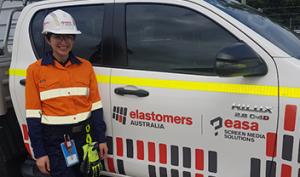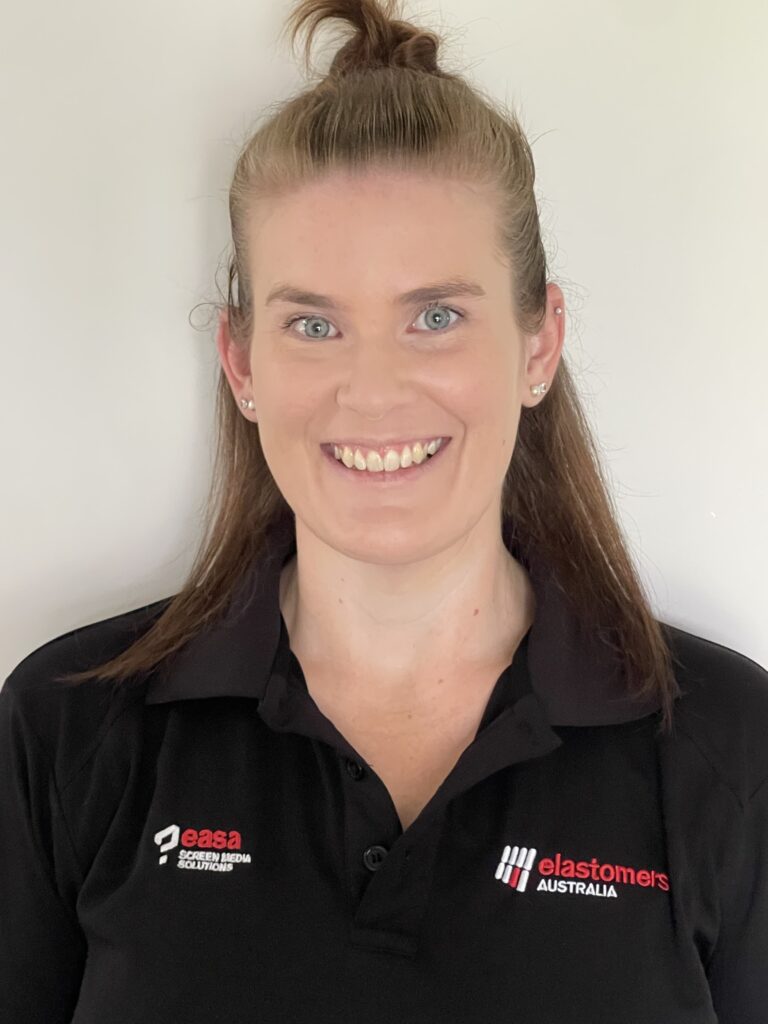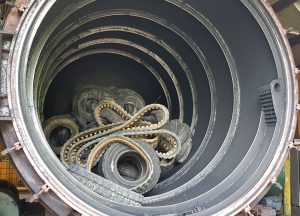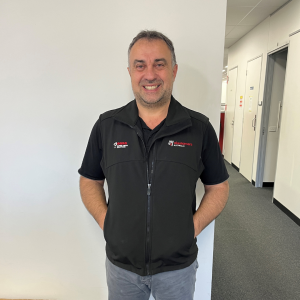
PEOPLE FOCUS DRIVES SARAH IN HR CAREER
Elastomers Australia Human Resources Manager Sarah Homsi lives by the same values that drive the company.

EA: What is your role at Elastomers Australia (EA)?
Evie: “I am the Senior OHS Advisor at Elastomers Australia and have been with the company for around 6 months. I work within the OHS department.
My role involves ensuring that I am across any and all initiatives, projects, and improvements for the safety, health, and wellbeing of our people. I am responsible for guaranteeing that should someone get injured at work, a thorough investigation is completed so additional controls are put in place to reduce the risk of it reoccurring.”
EA: What prompted you to follow a career in OHS?
Evie: “Originally, I had my sights set on being a chef.
One day my parents sat my sister and I down at the kitchen table to tell us that dad was going out to work in the mines. They explained that he wouldn’t be home every night as he’d be working on some “really big things”.
Not entirely knowing what that meant, all we understood was that if something were to happen, the outcome may not be a good one – he may come home injured, he may not come home at all. It was stressed to us that it was now our responsibility as a family to make sure he came home safe, to us his loving family.
From that day on, I realised I no longer wanted to be a chef.
I wanted to make sure my dad would safely return home to me after every shift and that everybody else be in the same boat.
It’s funny, my dad always told me I wasn’t allowed to give him directions growing up and that me entering the OHS field wouldn’t change that but when I have worked with my dad and had those safety conversations with him that he didn’t realise I was having at work, he’d suddenly go, “OMG you just safety-d me”. It’s become a good in-house joke now.
It’s important to know and understand that the conversations you have at home relate to everything you do outside of the home environment. Safety doesn’t pertain to the workplace only.
Ultimately, I wouldn’t change my role for the world. It came down to making sure my dad came home to me and now, I get to make sure that everybody else goes home to their family as well, safely.”
EA: How has the OHS department seen safety improve at Elastomers Australia?
Evie: “In the last six months, I have seen the safety culture shift as a result of getting our safety message out to the workplace. The team better understand that the safety department is there to assist them.
In my eyes, our team are the content experts. They know of all the hazards, the risks, and what could be improved for their own safety. The change in culture I’ve seen is that they’ll now come to me and say, “this is the problem, this is the potential solution, and I need your support to help me get it across the line”. From there on out, our role is to focus on how we get there, whether it be a short-term, mid-term or long-term project.
We’re seeing a lot more accountability, buy in, and ownership and with those 3 concepts we’ll be able to get anything across the line.”
EA: How has the safety culture among staff changed over the last few years?
Evie: “People now understand why our department exists. They realise the benefit of having a team dedicated to safety and risk mitigation and recognise how vital it is to ensure the right steps are taken to prevent any injuries from occurring again.
The understanding of the importance of reporting all forms of risks and incidents has become a huge part of the way the company operates. What someone might see as a minor risk, someone else perceives as a major risk. We need to make sure that message is communicated in a standardised approach so that everybody can read it, understand it, and be able to do that job safely.”
EA: What ways does EA support physical and mental wellbeing?
Evie: “In regard to the physical side of things, Elastomers Australia has a pre-employment medical which all staff are required to complete.
We also have ‘mining’ medicals which our servicing team take part in as well as preventative noise assessment surveys in our branches to ensure our manufacturing and workshop personnel are not exposed to exceedances in noise over an 8-hour standard day.
In regard to mental health, we have an Employee Assistance Program (EAP) provider, Telus Health. The EAP that Elastomers Australia offer is a service provided to staff and their immediate family members as a benefit to assist with any issues that may arise affecting personal or work life. The program is free, highly confidential and available 24/7. Resources and support can be provided on some of the following issues;
We are also investigating alternative options for future that support the mental wellbeing of our people whilst at work. We want to provide additional controls where, if someone were to realise they are not feeling right or something has triggered them, they can walk into an office, shut the door and feel comfortable to speak with a mental health first aider.
Most people don’t know and are not necessarily comfortable opening up to anybody and everybody. We need to encourage staff and be able to ask “R U OK” more often.”
EA: Why is it so important for Elastomers Australia to prioritise health and safety?
Evie: “Ultimately, because we want to. It is something we are passionate about. The OHS department works within Elastomers Australia to develop a deeper understanding of our workforce. This way we figure out the best ways to help people of all backgrounds, cultures, and dynamics to communicate and take on information.
In today’s globalised and diverse workplaces, safety professionals play a crucial role in fostering a culture of safety. Communicating effectively and facilitating learning among a diverse audience presents unique challenges. Different backgrounds, languages, and cultural nuances can impact how safety information is received and understood.
To address these challenges, safety professionals must adopt strategies that promote inclusivity and ensure that safety messages resonate with all employees. Providing safety materials, training manuals, and signage in multiple languages ensures accessibility for all employees, mitigating language barriers.
We’ve seen our teams’ passion translate to the workforce, with almost 100 per cent of our staff reporting that they have a good understanding of EA’s health and safety policies – which is fantastic.
We are even getting recognised by our external clients on how much focus and priority we do place on safety. Several of our clients are continuously asking us to come out and build relationships on site and attend their external contractor reviews to give a safety share so they can learn how we talk, listen, and prioritise health and safety.
We don’t just say what people want to hear. EA walks the walk, EA means it, EA cares, EA supports and much of that can be traced back to our core values.”
EA: What is one message you would like to share this World health Day?
Evie: “Often people see the OHS department as policemen; if you end up in the office, you’re in trouble, you’ve done something wrong, you’re going to lose your job.
That stigma is incredibly old-school and outdated. Safety today is about engaging your teams and encouraging them to take personal responsibility for one another’s safety. It’s not an easy process, but it’s well worth the time and effort.
When safety is a top priority, teams across all levels share the company’s safety values in everyday routines and tasks which in turn become an embedded habit. By working together everyone on the team will perceive workplace safety as part of their job responsibilities as opposed to compliance and paperwork.
If something doesn’t feel right (chronic unease), if something isn’t working as intended, if you hear something that’s not right… Stop and ask for help.
The OHS department will support you in that journey, whether it’s work related or non-work related, because once you lose control of your health, it’s gone forever and it takes time, effort, strength, and money to recover. You’re going to feel it, and you may never get back to your 100 per cent potential.
Commit to your full, normal self as you know it. Never let it get to the point of no return.”

Elastomers Australia Human Resources Manager Sarah Homsi lives by the same values that drive the company.

A new partnership between Elastomers Australia and Novum Energy Australia is set to help miners offset their carbon footprints through an innovative process to recycle used rubber products.

While a downturn in the job market for engineers was at first a cloud over the career ambitions of a newly graduated Pat Caputo, it became the silver lining that has led to a multi-decade career with Elastomers Australia.